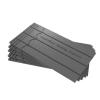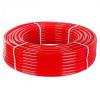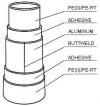XPS and EPS Insulation Boards, What is the difference between them?

XPS and EPS┬ĀInsulation Boards, What is the difference between them?
┬Ā
Manufacturing process and characteristics
┬Ā
XPS: Extruded polystyrene insulation or XPS Insulation is manufactured through an extrusion process. This manufacturing process involves melting together the plastic resin and other ingredients. The liquid formed is then continuously extruded through a die and expands during the cooling process. This produces a closed-cell rigid insulation.
┬Ā
EPS: Expanded polystyrene insulation or EPS insulation is manufactured using a mould to contain small foam beads. Heat or steam is then applied to the mould, which causes the small beads to expand and fuse together. This manufacturing process does not form a closed cell insulation┬Āas there can often be voids between each of the beads where they are not touching one another.
┬Ā
┬Ā
Compressive strength
┬Ā
Compressive strength is demanded in the most challenging environments such as under slabs on a flat roof, concrete floors, foundations, plaza and podium decks and cold storage. In general, when comparing EPS and XPS board densities, the compressive strength of XPS is greater than that of EPS. For EPS to achieve the same compressive strength as XPS, the density of the foam would need to be increased, often resulting in a greater thickness of board being required.
┬Ā
Water Absorption
┬Ā
Water vapour diffusion resistance (╬╝) of EPS ranges from approximately 30 ŌĆō 70 ┬Ācompared to the water vapour diffusion resistance (╬╝) of XPS that ranges from approximately 80 ŌĆō 250. The interconnected voids between the beads in EPS can allow water to penetrate.┬ĀThis will degrade the insulating performance as water is a good conductor of heat.
┬Ā
Thermal Conductivity
┬Ā
Both XPS and EPS provide good thermal conductivity performance. However, the air trapped in the voids in the EPS will conduct heat.┬ĀHowever, the air trapped in the voids in the EPS will conduct heat. XPS has a better thermal performance than EPS.┬ĀA much higher density EPS board will be required to match the thermal performance of XPS insulation.
┬Ā
Our XPS
┬Ā
Our XPS insulation boards are designed specifically for use with electric underfloor heating systems, very high compressive strength (30 tonnes / m2), lightweight, high efficiency, and low cost make this thermal board an ideal choice when fitting heating on to a poorly insulated concrete or screed base and works excellently with underfloor heating underwood and under tile systems. Insulation boards come with a 50-year warranty.

Order Online:┬Āhttps://underfloorheatingexpress.com/master-6mm-underfloor-heating-xps-premium-insulation-board-1200mm-x-600mm.html













Validate your login
Sign In
Create New Account